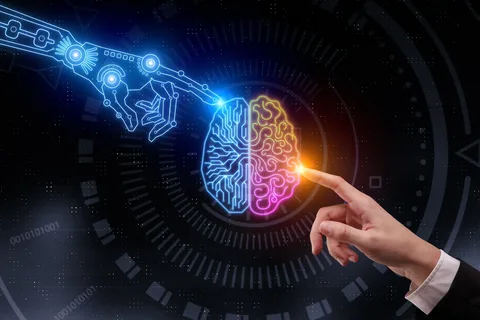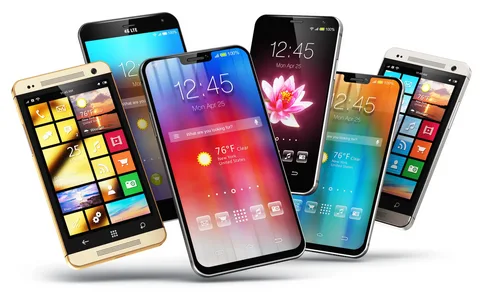Introduction:
In the ever-evolving landscape of the modern world, technology stands as the driving force behind transformative shifts in how we live, work, and connect with one another. From the seamless communication facilitated by smartphones to the profound implications of artificial intelligence and the revolutionary principles of blockchain technology, the contemporary era is marked by an unprecedented integration of technological innovations into every facet of our daily existence. In this discussion, we will explore three compelling examples of technology, delving into the intricacies technology of their functionalities and the profound impact they wield on society, ushering in a new era of possibilities and reshaping the way we navigate the complexities of the 21st century.

Table of Contents
1. Smartphones:

Communication Revolution:
Smartphones, once humble communication devices, have undergone a metamorphosis into indispensable tools that transcend traditional calling. The advent of text messaging and the proliferation of messaging apps have not only revolutionized personal communication but have also transformed the business landscape. With the ability to send instant messages, share multimedia content, and conduct video calls, smartphones have become the epicenter of our connected world.
Moreover, the rise of social media platforms has turned smartphones into hubs for information sharing, news consumption, and real-time updates. The ripple effect of this communication revolution extends to activism, where social media has been a catalyst for social change, giving a voice to the masses and providing a platform for collective action.
Multifunctional Devices:
Smartphones are no longer confined to communication alone; they have evolved into multifunctional devices that encapsulate the capabilities of various gadgets. The integration of high-quality cameras has turned every smartphone user into a potential photographer, capturing moments and memories with unprecedented ease.
GPS navigation has become an integral part of our daily lives, guiding us through unfamiliar streets and optimizing our travel routes. The advent of internet browsing on smartphones has democratized access to information, making knowledge ubiquitous and empowering users with the ability to learn, explore, and connect with the world.
Furthermore, the app ecosystem has turned smartphones into versatile tools for both personal and professional tasks. From productivity apps that streamline work processes to fitness apps that monitor our health, smartphones have become indispensable companions, seamlessly integrating into the fabric of our daily routines.
Innovation and Competition:
The smartphone industry is a testament to the relentless pace of technological innovation. Each year witnesses the unveiling of new models, each equipped with enhanced features and capabilities. From faster processors to improved camera technologies, manufacturers engage in a constant race to outdo one another, pushing the boundaries of what a smartphone can achieve.
This perpetual cycle of innovation not only brings cutting-edge technology to consumers but also fuels economic growth and job creation. The competition among smartphone manufacturers fosters a culture of continuous improvement, where consumer preferences and technological advancements coalesce to shape the future of communication technology.
In essence, smartphones not only connect us to one another but also serve as catalysts for innovation, driving the evolution of technology in a direction that is both exciting and transformative.
2. Artificial Intelligence (AI):

Automation and Efficiency:
Artificial Intelligence, once the realm of science fiction, has become an integral part of our daily lives, revolutionizing the way we work and interact with technology. At its core, AI is about automating tasks, freeing up human resources for more creative and complex endeavors.
In various industries, from manufacturing to customer service, AI is streamlining operations by taking over routine and repetitive tasks. Chatbots, powered by AI, provide instant customer support, responding to queries and resolving issues in real-time. This not only enhances customer satisfaction but also allows human agents to focus on more nuanced and complex aspects of customer interactions.
In the workplace, AI is augmenting human capabilities, automating mundane tasks like data entry and analysis. This not only increases efficiency but also opens up opportunities for employees to engage in higher-order thinking, problem-solving, and innovation.
Personalization and Recommendation Systems:
One of the most impactful manifestations of AI in our daily lives is through recommendation systems. Platforms like Netflix, Amazon, and Spotify leverage AI algorithms to analyze user behavior, preferences, and historical data. The result is a personalized user experience that anticipates and caters to individual tastes.
Recommendation systems not only enhance user satisfaction but also contribute to the bottom line of businesses. By accurately predicting what a user might be interested in, companies can tailor their offerings, leading to increased customer engagement and, consequently, higher revenues.
The implications of personalized AI-driven recommendations extend beyond entertainment. In e-commerce, AI algorithms power product recommendations, creating a personalized shopping experience for consumers. This level of customization not only improves user experience but also fosters brand loyalty.
Medical Advancements:
In the realm of healthcare, AI is a revolutionary force, contributing to diagnostics, drug discovery, and personalized treatment plans. Machine learning algorithms analyze vast datasets, including patient records, genetic information, and clinical studies, to identify patterns and correlations that would be nearly impossible for humans to discern.
Diagnostic tools powered by AI can detect anomalies in medical images with a level of accuracy that surpasses human capabilities. This not only expedites the diagnosis process but also reduces the margin of error, potentially saving lives.
In drug discovery, AI accelerates the identification of potential compounds and their efficacy. By sifting through massive datasets and simulating various scenarios, AI expedites the research and development process, bringing new drugs to market more efficiently.
Moreover, AI facilitates the concept of precision medicine, where treatment plans are tailored to the individual characteristics of each patient. This personalized approach not only improves outcomes but also minimizes side effects, marking a paradigm shift in how we approach healthcare on an individual level.
In essence, AI is not merely a technological trend but a transformative force that is reshaping industries and redefining the possibilities of human-machine collaboration.
3. Blockchain Technology:

Decentralization and Trust:
Blockchain technology, the backbone of cryptocurrencies like Bitcoin, introduces a paradigm shift in how we establish trust and conduct transactions in a digital landscape. At its core, blockchain is a decentralized and tamper-resistant ledger that records transactions across a network of computers.
The decentralized nature of blockchain eliminates the need for a central authority, be it a bank, government, or intermediary. This decentralized consensus model not only democratizes access to financial services but also enhances security by removing single points of failure.
The immutability of the blockchain ledger ensures that once a transaction is recorded, it cannot be altered. This feature not only prevents fraud but also instills a high level of confidence in the integrity of the transaction history. In a world where data breaches and cyber attacks are rampant, blockchain technology provides a secure and transparent alternative for conducting transactions.
Smart Contracts:
One of the most revolutionary aspects of blockchain technology is the concept of smart contracts. These self-executing contracts have their terms directly written into code, automating and enforcing contractual agreements without the need for intermediaries.
Smart contracts operate on an “if-then” logic, where predefined conditions trigger automatic execution. This not only expedites the contract fulfillment process but also reduces the risk of disputes and errors. In industries ranging from real estate to supply chain management, smart contracts are streamlining processes and redefining the way we engage in contractual agreements.
The programmable nature of smart contracts opens up a world of possibilities for automation in various sectors. For example, in the supply chain, smart contracts can automatically trigger payments upon the successful delivery of goods, creating a more transparent and efficient system.
Supply Chain Transparency:
Blockchain technology has the potential to revolutionize supply chain management by providing end-to-end transparency. In industries where the origin and journey of products are critical, such as food and pharmaceuticals, blockchain ensures that every step of the production and distribution process is recorded and verifiable.
This transparency not only reduces the risk of fraud and counterfeit products but also enhances accountability. Consumers, armed with access to a tamper-resistant ledger, can trace the origin of products, ensuring ethical sourcing practices and supporting companies that prioritize sustainability.
In addition to transparency, blockchain’s decentralized nature contributes to the resilience of supply chains. In the face of disruptions, such as natural disasters or geopolitical events, the decentralized nature of blockchain ensures that critical information is not concentrated in a single point of failure.
In conclusion, blockchain technology is not merely a tool for financial transactions but a transformative force that has the potential to revolutionize industries by providing a secure, transparent, and automated framework for conducting and recording transactions.
Conclusion:
In the vast tapestry of technological advancements, smartphones, artificial intelligence, and blockchain stand out as exemplars of innovation, each weaving its own narrative of transformation and impact. From the way we communicate and work to the very foundations of trust and transparency, these technologies are not mere tools; they are architects of the future.
As we navigate this era of rapid technological evolution, it becomes imperative to understand not only the functionalities of these innovations but also their broader implications on society, economy, and human interaction. The symbiotic relationship between humans and technology unfolds a narrative that is both awe-inspiring and challenging, calling for a nuanced understanding and ethical stewardship of the digital frontier.
In essence, the examples explored here serve as windows into a future where the boundaries between the physical and digital worlds blur, where innovation is not a destination but a continuous journey, and where the human experience is intricately woven into the fabric of technological progress. In this convergence, the choices we make today will shape the world we inhabit tomorrow, urging us to approach technology not merely as a tool but as a force that shapes the very contours of our existence.
FAQs
1. Smartphones:
Q1: How have smartphones revolutionized communication?
A1: Smartphones have revolutionized communication by providing instant access to voice calls, text messaging, and various messaging apps. They serve as multifunctional devices, integrating features like high-quality cameras, GPS navigation, and internet browsing, fundamentally transforming the way we connect and share information.
Q2: How do smartphones contribute to innovation?
A2: Smartphones drive innovation through intense competition among manufacturers. Each year, new models boast improved capabilities, from faster processors to enhanced cameras, fostering a continuous cycle of technological advancement. This not only benefits consumers with cutting-edge features but also stimulates economic growth and job creation.
Q3: What role do smartphones play in social activism?
A3: Social media platforms on smartphones serve as catalysts for social change and activism. The ease of sharing information, organizing events, and mobilizing communities has empowered individuals to have a global impact. Smartphones have become powerful tools for amplifying voices and driving societal transformations.
2. Artificial Intelligence (AI):
Q4: How does AI enhance efficiency in the workplace?
A4: AI enhances workplace efficiency by automating routine and repetitive tasks. Chatbots, for example, provide instant customer support, freeing up human agents for more complex interactions. In industries like manufacturing, AI-driven automation optimizes processes, allowing human resources to focus on higher-order tasks.
Q5: What is the significance of AI-driven recommendation systems?
A5: AI-driven recommendation systems, seen in platforms like Netflix and Amazon, analyze user behavior to provide personalized experiences. This not only improves user satisfaction but also contributes to increased engagement and revenues for businesses. AI-driven recommendations extend beyond entertainment to e-commerce and various other sectors.
Q6: How is AI transforming healthcare?
A6: AI is revolutionizing healthcare through diagnostics, drug discovery, and personalized medicine. Machine learning algorithms analyze vast datasets to identify patterns in medical images, accelerating diagnosis. In drug discovery, AI speeds up research, and in personalized medicine, it tailors treatment plans to individual patient characteristics.
3. Blockchain Technology:
Q7: What is the significance of decentralization in blockchain?
A7: Decentralization in blockchain eliminates the need for a central authority, fostering trust in digital transactions. This secure and tamper-resistant ledger ensures transparency, reduces the risk of fraud, and democratizes access to financial services, challenging traditional centralized systems.
Q8: How do smart contracts work, and what role do they play in various industries?
A8: Smart contracts are self-executing contracts with terms written into code. They automate and enforce contractual agreements, reducing the need for intermediaries. In industries like real estate and supply chain management, smart contracts streamline processes, minimize errors, and enhance efficiency.
Q9: How does blockchain contribute to supply chain transparency?
A9: Blockchain ensures end-to-end transparency in supply chains by recording and verifying each step of the production and distribution process. This reduces the risk of fraud, counterfeiting, and unethical practices. Consumers can trace the origin of products, supporting ethical and sustainable practice.
 Nextezone: Igniting Tomorrow's Potential with Innovation Today Innovate. Explore. Elevate. Nextezone – Where Vision Meets Innovation.
Nextezone: Igniting Tomorrow's Potential with Innovation Today Innovate. Explore. Elevate. Nextezone – Where Vision Meets Innovation.
